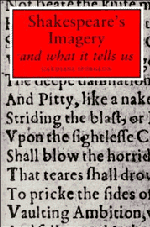Book contents
- Frontmatter
- ACKNOWLEDGEMENTS
- PREFACE
- Contents
- ILLUSTRATIONS
- Part I THE REVELATION OF THE MAN
- I The Aim and Method explained
- II Shakespeare's Imagery compared with that of Marlowe and Bacon
- III Imagery of Shakespeare and other Dramatists compared
- IV The Subject-matter of Shakespeare's Images
- V Shakespeare's Senses
- VI Shakespeare's Tastes and Interests
- VII Shakespeare's Tastes and Interests (continued)
- VIII Evidence in the Images of Shakespeare's Thought
- IX Evidence in the Images of Shakespeare's Thought (continued)
- X Association of Ideas
- XI Shakespeare the Man
- Part II THE FUNCTION OF THE IMAGERY AS BACKGROUND AND UNDERTONE IN SHAKESPEARE'S ART
- APPENDICES
- INDEX
- CHARTS
XI - Shakespeare the Man
Published online by Cambridge University Press: 20 February 2010
- Frontmatter
- ACKNOWLEDGEMENTS
- PREFACE
- Contents
- ILLUSTRATIONS
- Part I THE REVELATION OF THE MAN
- I The Aim and Method explained
- II Shakespeare's Imagery compared with that of Marlowe and Bacon
- III Imagery of Shakespeare and other Dramatists compared
- IV The Subject-matter of Shakespeare's Images
- V Shakespeare's Senses
- VI Shakespeare's Tastes and Interests
- VII Shakespeare's Tastes and Interests (continued)
- VIII Evidence in the Images of Shakespeare's Thought
- IX Evidence in the Images of Shakespeare's Thought (continued)
- X Association of Ideas
- XI Shakespeare the Man
- Part II THE FUNCTION OF THE IMAGERY AS BACKGROUND AND UNDERTONE IN SHAKESPEARE'S ART
- APPENDICES
- INDEX
- CHARTS
Summary
He is a marvellous good neighbour, faith, and a very good bowler.
L.L.L. 5. 2. 584.Asi have collected and examined these many thousands of images, and have pondered over them during the last nine or ten years, there has gradually emerged before my eyes a very definite figure of the man who was the author of them.
Naturally every student of Shakespeare gradually forms some picture—more or less defined—of the man himself behind the plays, but equally every student is well aware of the danger and futility of trying, or even of passively allowing himself, to deduce from Shakespeare's dramatic utterances what Shakespeare himself thinks and feels; for it is study along this line which has led industrious and well-meaning people to argue and prove that he was a devout Christian like Isabella, or a scoffing materialist like Macbeth, while others prefer to see him rather with the philosophic Edgar when he affirms, ‘Ripeness is all’.
In and through these utterances Shakespeare himself for ever eludes us, and the reason is, it would seem, because he is with all his characters and feels with them all; he debates and hesitates with Hamlet, and is all impulse with Romeo; he prays to the God of battles with King Harry, and rails on Heaven with Gloucester. He was, in short, as all men of greatest imagination must be, many-sided and of many moods, not set stiffly as most of us are, running along certain well-used grooves, but almost fluid in his swift adaptability and responsiveness both to what he saw and to what he imagined.
- Type
- Chapter
- Information
- Shakespeare's Imagery and What it Tells Us , pp. 200 - 210Publisher: Cambridge University PressPrint publication year: 1935



